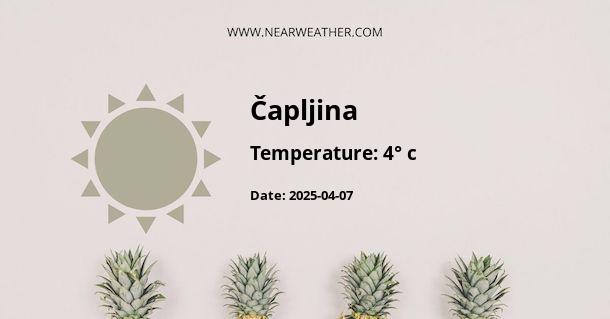Understanding the Climate and Weather Patterns of Čapljina, Bosnia and Herzegovina
Čapljina, situated in the southern part of Bosnia and Herzegovina, near the Adriatic Sea, is a locale with a Mediterranean climate influenced by its proximity to the coast and the Dinaric Alps. This geographic positioning bestows upon Čapljina a climate that is typically characterized by hot summers and mild, wet winters. To delve into a comprehensive analysis, we shall explore seasonal weather patterns, temperature averages, precipitation data, and climatic nuances that define Čapljina.
Spring in Čapljina
Springtime in Čapljina witnesses a transitional phase as temperatures gradually ascend from the coolness of winter. The following tabular representation provides an average snapshot for this season:
| Month | Average High (°C) | Average Low (°C) | Precipitation (mm) |
|---|---|---|---|
| March | 16 | 7 | 70 |
| April | 20 | 11 | 80 |
| May | 25 | 15 | 75 |
During spring, Čapljina's flora blossoms and the landscape is imbued with vibrant colors. It is also the onset of the tourist season as the weather becomes more conducive for outdoor activities.
Summer in Čapljina
Summers are typically hot and sunny, with clear skies being a common feature. Čapljina's proximity to the Adriatic Sea helps temper some of the intense heat. Here is the data reflecting the summer conditions:
| Month | Average High (°C) | Average Low (°C) | Precipitation (mm) |
|---|---|---|---|
| June | 30 | 19 | 50 |
| July | 33 | 21 | 40 |
| August | 33 | 21 | 50 |
In these months, locals and tourists alike flock to nearby coastal areas to seek reprieve from the heat. The Neretva River also provides opportunities for recreation and relief.
Autumn in Čapljina
The autumn season brings a gradual cooldown with a noticeable increase in precipitation. This shift announces the end of the peak tourist season:
| Month | Average High (°C) | Average Low (°C) | Precipitation (mm) |
|---|---|---|---|
| September | 28 | 17 | 70 |
| October | 23 | 13 | 90 |
| November | 18 | 9 | 110 |
Autumn is celebrated for its harvest season, with the region being well-noted for its figs, pomegranates, and citrus fruits. Increased rainfall contributes to the harvest but can also lead to occasional flooding due to the town's riverine geography.
Winter in Čapljina
Winters are generally mild, given the Mediterranean influence, but conditions can vary due to the cold air masses that occasionally sweep down from the northern part of the continent:
| Month | Average High (°C) | Average Low (°C) | Precipitation (mm) |
|---|---|---|---|
| December | 14 | 6 | 120 |
| January | 12 | 4 | 130 |
| February | 13 | 5 | 120 |
While snowfall in Čapljina is not common, it can occur, particularly in the higher altitudes of the surrounding Dinaric Alps. Winter also sees the highest level of precipitation throughout the year, which replenishes the natural water systems integral to the region's agriculture.
Unique Climatic Features of Čapljina
The climate of Čapljina is heavily influenced by several unique geographical features. The Adriatic Sea mitigates extremes in temperature, particularly during summer, providing a cooling effect via sea breezes. Conversely, the Dinaric Alps can create a shielding impact, which can trap cooler air in the winter, leading to colder periods than one might expect given the area's latitude.
Climate Data and Patterns
- Temperature Extremes: The warmest month is July with temperatures that can exceed 33°C (91°F), while January is the coldest month, occasionally dipping to freezing.
- Wettest Quarter: The winter months tend to be the wettest with an average precipitation of 120-130mm per month, increasing the risk of flooding.
- Summer Dryness: Tourists find summers to be prime for visiting due to the lower precipitation levels and consistent sunshine.
- Microclimates: Variability in elevation leads to microclimates across the region, significantly affecting local weather phenomena and farming practices.
Challenges and Opportunities
The climatic conditions in Čapljina present both challenges and opportunities. Agricultural producers must be astute to capitalize on the long growing season while mitigating risks posed by potential summer drought and winter flooding. The tourism industry thrives on the predictability of warm, sunny summers and mild, appealing winters.
Local authorities and stakeholders continuously monitor the climatic trends to inform their planning in sectors sensitive to weather variations, such as infrastructure development, agriculture, and tourism.
Conclusion
In sum, Čapljina's climate is a fine amalgamation of Mediterranean and continental influences leading to a diverse and dynamic weather system. The city's pleasant climate is not only a key aspect of its lifestyle and natural beauty but also central to its economic activities and cultural heritage. Understanding and adapting to these conditions are essential for residents and visitors alike to fully experience all that Čapljina has to offer.
A - Čapljina's Latitude is 43.121391 & Longitude is 17.684441.
A - Weather in Čapljina is 11° today.
A - Climate Conditions in Čapljina shows scattered clouds today.
A - Humidity in Čapljina is 88% today.
A - Wind speed in Čapljina is 5.87 km/h, flowing at 41° wind direction. today.
